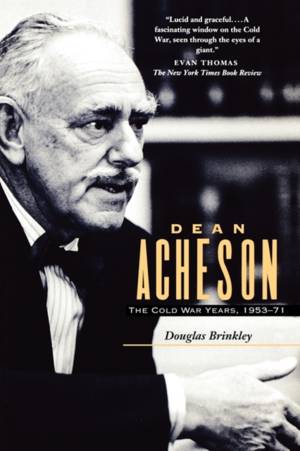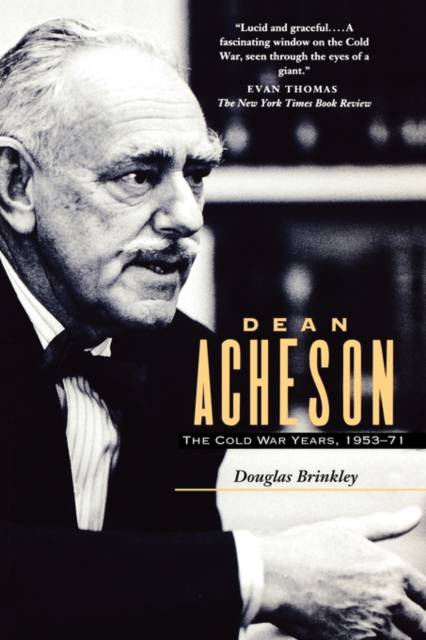
- Retrait gratuit dans votre magasin Club
- 7.000.000 titres dans notre catalogue
- Payer en toute sécurité
- Toujours un magasin près de chez vous
- Retrait gratuit dans votre magasin Club
- 7.000.0000 titres dans notre catalogue
- Payer en toute sécurité
- Toujours un magasin près de chez vous
93,45 €
+ 186 points
Description
Dean Acheson is best remembered as President Harry Truman's powerful secretary of state, the American father of NATO, and a major architect of U.S. foreign policy in the decade following the Second World War. But Acheson also played a major role in politics and foreign affairs after his tenure in the Truman administration, as an important Democratic Party activist and theorist during the Eisenhower presidency and as a valued adviser during the Kennedy, Johnson, and Nixon administrations. This engrossing book, the first to chronicle Acheson's postsecretarial career, paints a portrait of a brilliant, irascible, and powerful man acting during a turbulent period in American history.
Drawing on the recently opened Acheson papers as well as on interviews with Acheson's family and with leading public figures of the era, Douglas Brinkley tells an intriguing tale that is part biography, part diplomatic history, and part politics. Brinkley considers Acheson's role in numerous NATO-related debates and task forces, the Berlin and Cuban missile crises, Vietnam War decision-making, the Cyprus dispute of 1964, the anti-de Gaulle initiative of the 1960s, and U.S.-African policy. He describes Acheson as a staunch anticommunist with a persistent Eurocentric focus, a man who was intolerant of American leaders such as George Kennan, J. William Fulbright, and Walter Lippmann for opposing his views, and who often feuded with JFK, LBJ, Robert McNamara, and Dean Rusk. Finally, angered at the activities of anti-Vietnam War liberal Democrats, Acheson found himself in 1969 serving as one of Nixon's most important unofficial foreign policy advisers. Throughout this time, Acheson stayed in the public eye, helped by the six books he wrote after he left office (including the Pulitzer Prize-winning Present at the Creation), his television appearances, lectures, testimony before Congress, and correspondence with European statesmen. Brinkley's book illuminates Acheson as elder statesman and reveals how a unique individual was able to influence policy-making and public opinion without the official trappings of office.
Drawing on the recently opened Acheson papers as well as on interviews with Acheson's family and with leading public figures of the era, Douglas Brinkley tells an intriguing tale that is part biography, part diplomatic history, and part politics. Brinkley considers Acheson's role in numerous NATO-related debates and task forces, the Berlin and Cuban missile crises, Vietnam War decision-making, the Cyprus dispute of 1964, the anti-de Gaulle initiative of the 1960s, and U.S.-African policy. He describes Acheson as a staunch anticommunist with a persistent Eurocentric focus, a man who was intolerant of American leaders such as George Kennan, J. William Fulbright, and Walter Lippmann for opposing his views, and who often feuded with JFK, LBJ, Robert McNamara, and Dean Rusk. Finally, angered at the activities of anti-Vietnam War liberal Democrats, Acheson found himself in 1969 serving as one of Nixon's most important unofficial foreign policy advisers. Throughout this time, Acheson stayed in the public eye, helped by the six books he wrote after he left office (including the Pulitzer Prize-winning Present at the Creation), his television appearances, lectures, testimony before Congress, and correspondence with European statesmen. Brinkley's book illuminates Acheson as elder statesman and reveals how a unique individual was able to influence policy-making and public opinion without the official trappings of office.
Spécifications
Parties prenantes
- Auteur(s) :
- Editeur:
Contenu
- Nombre de pages :
- 446
- Langue:
- Anglais
Caractéristiques
- EAN:
- 9780300060751
- Date de parution :
- 31-08-94
- Format:
- Livre broché
- Format numérique:
- Trade paperback (VS)
- Dimensions :
- 152 mm x 235 mm
- Poids :
- 712 g

Les avis
Nous publions uniquement les avis qui respectent les conditions requises. Consultez nos conditions pour les avis.






